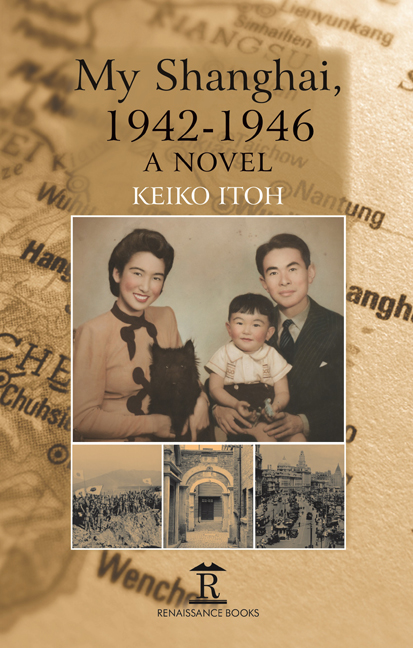Book contents
- Frontmatter
- Dedication
- Contents
- Names of Main Characters
- Brief Historical Timeline
- Japanese Honorifics
- Map of Pre-war Greater Shanghai
- PART 1 [Thursday, 15 January 1942–Friday, 31 March 1944]
- PART 2 [Monday, 3 April 1944–Thursday, 26 March 1946]
- Epilogue Tuesday, 9 April 1946, Shukugawa, Japan
- Acknowledgements
24 - Wednesday, 3 October 1945
Published online by Cambridge University Press: 04 May 2022
- Frontmatter
- Dedication
- Contents
- Names of Main Characters
- Brief Historical Timeline
- Japanese Honorifics
- Map of Pre-war Greater Shanghai
- PART 1 [Thursday, 15 January 1942–Friday, 31 March 1944]
- PART 2 [Monday, 3 April 1944–Thursday, 26 March 1946]
- Epilogue Tuesday, 9 April 1946, Shukugawa, Japan
- Acknowledgements
Summary
Tamiko and I decided to find Irma, to give her the news of Masaya. ‘If she's still in her old place, it's within the bounds of where Japanese are allowed to go,’ Tamiko said, as we headed towards the former Designated Area.
Little had changed since the massive air-raid. The crater in the middle of the road was still there, and the damaged buildings were left mainly unrepaired – just a few boards put up here and there to make them marginally habitable. War's end didn't seem to have made much difference to people's daily lives. The entrance to Irma's building was as shabby as ever, and Tamiko stood across the lane shouting Irma's name as I banged on the door.
We made louder and louder sounds, until we thought we would have to give up, when suddenly we heard a voice from above: ‘Lieblings! Wunderbar! How did you know that Keith was here?’ Tamiko and I looked at each other in disbelief – that we found not only Irma but Keith as well.
In many ways, it was a sad reunion, to have to share the news of Masaya's death, and to see the physical change in Irma and Keith. Even though I’d seen Irma not too long ago, she was now walking with a limp and had turned completely grey. But Keith's emaciation was a true shock, his face so gaunt that I might not have recognized him if I saw him on the street. What hadn't changed were his soft brown eyes with a compassionate glow.
‘I still spend the days in the camp, and go back to our old house in Frenchtown for the night. For the time being, Joyce and Anna May are staying with some German friends,’ Keith said.
Irma quickly took over. ‘When the war ended, things were chaotic – lots of euphoria, but uncertainty too. Many internees at the camp were losing their heads. So Keith took on the role of welfare officer, to bring some order, and he still goes there to help people with nowhere to go. Isn't that right, Keith?’
- Type
- Chapter
- Information
- My Shanghai, 1942-1946A Novel, pp. 332 - 352Publisher: Amsterdam University PressPrint publication year: 2016



